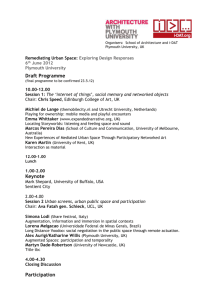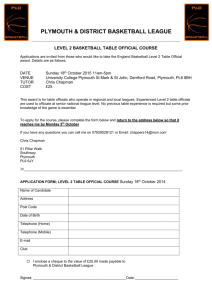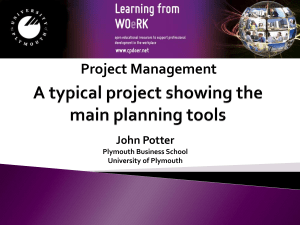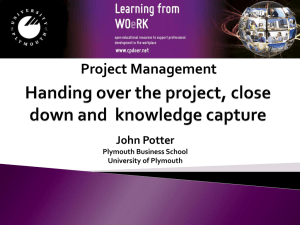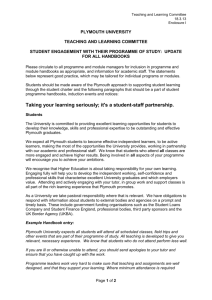History Departmental Newsletter
advertisement
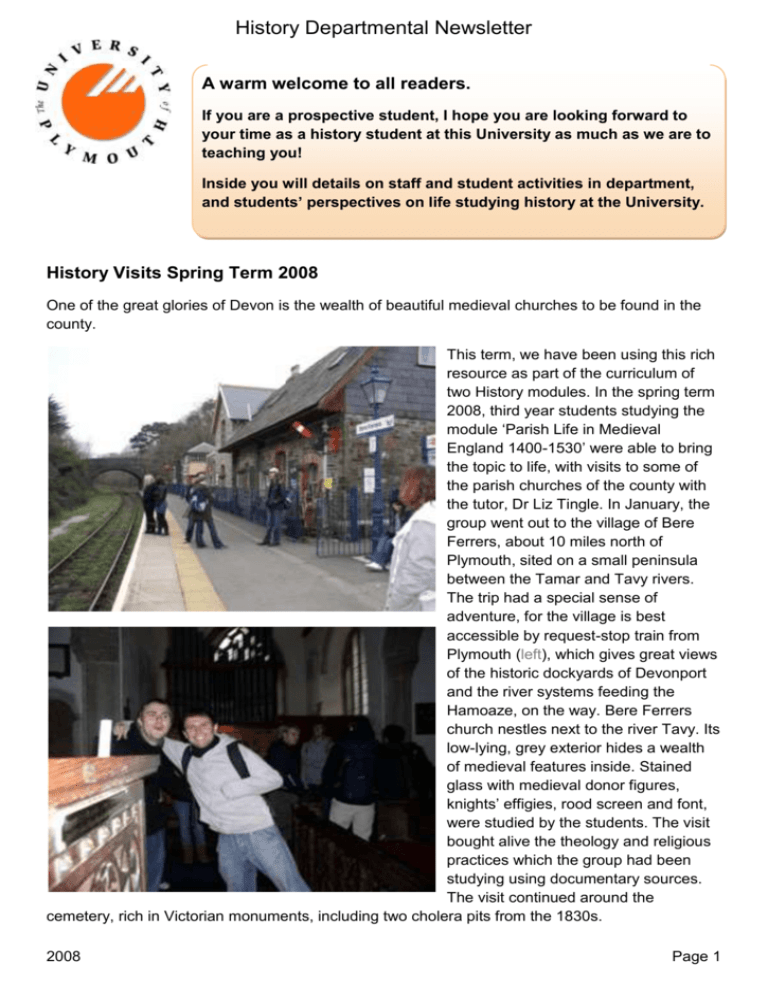
History Departmental Newsletter A warm welcome to all readers. If you are a prospective student, I hope you are looking forward to your time as a history student at this University as much as we are to teaching you! Inside you will details on staff and student activities in department, and students’ perspectives on life studying history at the University. History Visits Spring Term 2008 One of the great glories of Devon is the wealth of beautiful medieval churches to be found in the county. This term, we have been using this rich resource as part of the curriculum of two History modules. In the spring term 2008, third year students studying the module ‘Parish Life in Medieval England 1400-1530’ were able to bring the topic to life, with visits to some of the parish churches of the county with the tutor, Dr Liz Tingle. In January, the group went out to the village of Bere Ferrers, about 10 miles north of Plymouth, sited on a small peninsula between the Tamar and Tavy rivers. The trip had a special sense of adventure, for the village is best accessible by request-stop train from Plymouth (left), which gives great views of the historic dockyards of Devonport and the river systems feeding the Hamoaze, on the way. Bere Ferrers church nestles next to the river Tavy. Its low-lying, grey exterior hides a wealth of medieval features inside. Stained glass with medieval donor figures, knights’ effigies, rood screen and font, were studied by the students. The visit bought alive the theology and religious practices which the group had been studying using documentary sources. The visit continued around the cemetery, rich in Victorian monuments, including two cholera pits from the 1830s. 2008 Page 1 History Departmental Newsletter It ended with a welcome half-hour in nearby The Plough Inn, an opportunity for refreshment and warmth, before the train journey back to Plymouth. On 5th March, the third year group and tutor spent a day in east Devon, visiting two of the most significant parish churches of the county. Our first port of call was Ottery St Mary, famous for its association with the Coleridge family. St Mary’s church is virtually a scale-model of Exeter Cathedral, built by Bishop Grandisson as a chantry college and mausoleum for his family. The architecture and interior fittings are stunning, and were wonderfully explained to us by the archivist, Anne Willoughby. The students went on to explore St Andrew’s, Cullompton, in groups, with its superb Lane aisle, surviving rood screen and ‘Golgotha’. They are now busy with their own research exercise on the material culture of late medieval piety, and will present their results as part of the module assessment. A group of first year students taking the module ‘Presentations of History’ have also been out on a field visit, to Tavistock, on a clear cold day in early March, with snow lying on nearby Dartmoor. Part of the module involves reconstructing the landscapes of Tavistock Abbey, founded in 981 and dissolved in 1538. After looking at Tavistock’s Domesday estates and at the foundation of the town in the twelfth century, the students and tutor spent half a day examining the surviving remains of the abbey and the medieval town plan, on the ground. We also had a good look at the interior of St Eustace’s parish church, which contains some archaeological remains of the abbey. This was a valuable addition to the classroom curriculum, allowing us to consider the relationship between historical and archaeological evidence in reconstructions of past landscapes. Liz Tingle STUDENT PERSPECTIVES “I’ve just finished my first year on the History single BA (Hons) course at Plymouth University. During freshers’ week we were set the task of researching the history of Plymouth which I found really interesting, as I am from the south-east coast of England, and so I had very little knowledge of the area and its history beforehand. I found this related to the course and the area really well. So far I have found the course to be extremely interesting, and my favourite part has been the module America: from settlement to revolution. One advantage of the course is that, in the first year, the modules cover a wide range of modern history. I have found all the lecturers within the History department to be friendly and they are easily approachable. They also provide plenty of feedback on assignments throughout the year enabling me to improve 2008 on my grades, and keeps me aware of the level I am currently writing at. I was a student rep for the first years; we met regularly with faculty staff and a member of the library staff. Here, any issues from students are raised for the staff to look at. This gives the students the opportunity to get involved within the university and to have a say of their own on issues such as the course and the library. The University of Plymouth run exchanges with other Universities which allow students on the history course to study abroad in America or Canada for either a year or a term. This takes part during the second year of the undergraduate course and I have applied for this once in a lifetime opportunity to experience a different culture whilst studying. Page 2 History Departmental Newsletter There is also a wide variety of clubs and societies available at Plymouth University including many water sports as the university is located so close to the sea. I signed up to the dance society, the horse riding club and the history society. There are many fun socials which are usually themed which are organised by the clubs committee, allowing first year students to meet new people. I personally ride once a week and dance on Monday evenings which allows me time to enjoy the clubs but also manage time for my assignments. I currently live in halls of residence which has been the best experience of my life. You meet a wide variety of people from different backgrounds and I have made some of my closest friends through living in halls. Plymouth has a great social side to the city and there is always plenty to do so life is never boring here at Plymouth!” Kimberley Peck - year 1 “My time at Plymouth has certainly been lifechanging. I think I’ve grown up a lot, and apart from learning loads from a purely historical perspective, I also believe that any degree-level student who applies themselves can easily pick up a ton of experience in just working and writing independently, a discipline that can only help them in the further world of work.” welcomes enquiries and applications for next year (further details of the programmes can be found on the university website). In the autumn of 2007 Politics and the People: A History of British Democracy since 1918 was published by Atlantic Books, its theme described in the following review in the Financial Times: ‘Historian Kevin Jefferys thinks apathy has been endemic ever since universal suffrage was introduced in 1918. In this comprehensive and compelling study of political attitudes in the UK, he argues that there never was a golden age of democratic participation’. Since completing his four-year term as Head of the School of Humanities Harry Bennett has been busy working on a series of research/publishing projects. He is expanding his earlier work on the American GI in the West country 1942-45 into a book provisionally entitled Killing Time: The GI in Western Europe 1942-45. The book will examine what it was like to be a GI and offer a worms eye view of what it was like to be an American soldier sent to Europe to fight in the Second World War. James Mustoe – year 3 STAFF ACTIVITIES History’s two new postgraduate programmes – MA Social History and MRes History – both recruited well in 2007-08 and as Programme Leader, Kevin Jefferys 2008 A further article length and book length project concerns a piece of film that was recently donated to the South West Film and TV archive in Plymouth. It contains twenty minutes worth of wartime colour footage of 130 Squadron at RAF Perranporth and Portreath in 1942. Asked by the archive to Page 3 History Departmental Newsletter have a look at the film Bennett has been able to identify two of the pilots as belonging to the Free French Air Force. This has sparked a considerable interest in those pilots who rallied to Charles de Gaulle in 1940-42. By 1944 there were four Spitfire squadrons based in Britain whose pilots were French. Their story has largely been lost. There are hopes that the film can form the core of a documentary on the French pilots. Jacques "Jaco" Andrieux, heroic French pilot in world war two Bennett is also helping to create a ten-minute documentary film of the SS and German Police shot in South Russia in 1942-43. This mysteriously turned up in the film collection of a deceased Baptist minister from East Devon. The film appears to relate to the building of strategic route DG IV from Stalino to Lvov. That road, constructed with POW, Jewish and other slave labour, cost tens of thousands of lives to construct. Who shot the film is a mystery. Bennett is working with a documentary team to solve some of the mysteries around the film. In the last 18 months, James Daybell has published a monograph on Women LetterWriters in Tudor England (Oxford University Press, 2006); two journal articles “Scripting a Female Voice: Women’s Epistolary Rhetoric in Sixteenth-Century Letters of Petition”, 2008 Women’s Writing (2006) and “Recent Studies in Renaissance Letters: The Seventeenth Century”, English Literary Renaissance (2006); and an essay on “The Rhetoric of Friendship in Sixteenth-Century Women’s Letters of Intercession”, in Rhetoric, Gender, Politics: Representing Early Modern Women’s Speech, ed. Judith Richards and Alison Thorne (London: Routledge, 2006). He is currently completing a new monograph entitled, The Material Letter in Early Modern England, editing a collection on Material Readings in Early Modern England, 15801700 and preparing a handful of articles for publication. He has delivered papers on ‘Loyalty, Obedience and Authority in Sixteenth-Century Women’s Letters’ at Liverpool and Plymouth Universities, on ‘Women’s Letters, Literature and Conscience’ at Oxford University, on ‘Secret Letters in Early Modern England’ at the Renaissance Society of America Conference in Chicago, and on ‘Material Readings of Early Modern Culture’ at the University of Reading. In addition, he has obtained two grants from the British Academy (£2000 and £400) ¬– one to organise an international conference at Plymouth, the other to attend the Renaissance Society of America Annual Conference in Chicago in April 2008 – as well as a small grant from the Royal Historical Society. On the teaching front, last academic year he organised a trip to London for my second year undergraduates to see the Holbein Exhibition at Tate Britain. As organiser of the Department of History Research Seminar he has arranged for a series of outside speakers to talk at the University on various historical topics; he has convened two annual lectures (by Professor Barry Coward, President of the Historical Association and Professor Ralph Houlbrooke from the University of Reading) in memory of our late colleague Chris Durston, as well as a series of lectures on Social History in Spring 2008 as part of the launch of our new MA in Social History. Finally, with Peter Hinds in Page 4 History Departmental Newsletter English, he has organised an international conference on Material Readings of Early Modern Culture, 1580-1700 to be held in April 2008. Elizabeth Tingle moved to Plymouth University from the University of Northampton, in May 2006. She published Authority and Society in Nantes during the French Wars of Religion 1558-1598 with Manchester University Press in 2006. Recently, she has published articles and essays on the French Wars of Religion and the Catholic Reformation, in SixteenthCentury Journal, European History Quarterly and in Archaeology of Reformation (R. Gilchrist & D. Gaimster eds), Sacred Space in Early Modern Europe, (W. Coster & A. Spicer eds), and Moderate Voices in the Reformation (L. Racaut & A. Ryrie eds). She has forthcoming works in the Journal of Ecclesiastical History, French History and in several collections of essays. Last year, E. Tingle gave conference papers in Oxford, Leicester, Rennes and Bern; this year, she will be speaking at conferences in Montpellier, Galway and Lyons. She is currently working on the doctrine of purgatory and the practice of intercession for the dead, in Brittany, France, 1500-1720. Paul Brassley is a rural historian, which means that he is interested in everything that went on in the countryside in the past. He began by working on the 17th and 18th centuries, then transferred to the 19th, but in the last few years most of his work has been on the 20th century. He is particularly interested in the history of technical change in UK agriculture, but he also works on wider rural issues such as the decline of rural industries in England in the 1920s and ‘30s, the history of agricultural education, the English landscape between the wars, interwar land reform across Europe as a whole, and various aspects of farming and 2008 food supply in the UK and continental Europe in World War II. He was one of the founders of the Interwar Rural History Research Group, and edited (with Jeremy Burchardt and Lynne Thompson) its essay collection, The English Countryside Between the Wars (Boydell, 2006). He is currently Chair of the Executive Committee of the British Agricultural History Society, and involved in writing and presenting for several European book projects and seminar series on rural history. Since starting work at Plymouth in May 2007, Gary Peatling has published research articles in Eire-Ireland, the Journal of ScotchIrish Studies and the International Review of Scottish Studies. He also presented a paper to Plymouth's History research seminar in October 2007, and will soon publish an article in a volume edited by Isaac Land, to be entitled Enemies of Humanity, on nineteenthand twentieth-century "wars against terrorism". Last summer G. Peatling undertook research in London, Cambridge, Belfast, Dublin and Boston (Massachusetts). As well as teaching modern British and European history, he is currently pursuing a qualification in learning and teaching in higher education at the University of Plymouth. Outreach: Schools History Conference and Visits Having a large cohort of enthusiastic Sixth Form Historians I was eager to take up any opportunity which would help them experience university life, and if possible, History at University. The Sixth Form conference offered the chance to experience a proper ‘lecture’ as well as a seminar. For many the overview lecture was their best memory as it was on a topic new to most. The seminars were Page 5 History Departmental Newsletter valuable in showing how it was not something to be frightened of, in fact something to enjoy. The students also very much appreciated the visit of Dr Bennett to PHSG in December. His lecture on the US withdrawal from Vietnam helped them appreciate the global context of America's decision making and provoked much discussion in class afterwards about the ‘culture of loss’ on the North Vietnamese side. Again they were reassured that History at university would be enjoyable; challenging but not daunting. Our thanks go to all the staff who made these 2 opportunities happen for the girls. We were lucky in that we were nearby but we would recommend it to other staff who have to negotiate risk assessments, transport arrangements etc. Best of all, let the students make their own way there and be ‘proper’ university students. If there were any further opportunities our students would like the chance to deal with documents and interpretations of past events as this allows more room for discussion and the process of ‘doing history’. Claire Eales-White, Head of Humanities Faculty, Plymouth High School for Girls The history tutors at the University of Plymouth would love to hear from you! Please contact gary.peatling@plymouth.ac.uk Useful contact details: t: 01752 585100 e: arts.admissions@plymouth.ac.uk re: BA (Hons) History | MA Social History t: 01752 585030 e: artsresearch@plymouth.ac.uk re: MRes History | MPhil/PhD History www.plymouth.ac.uk/arts/history 2008 Page 6
